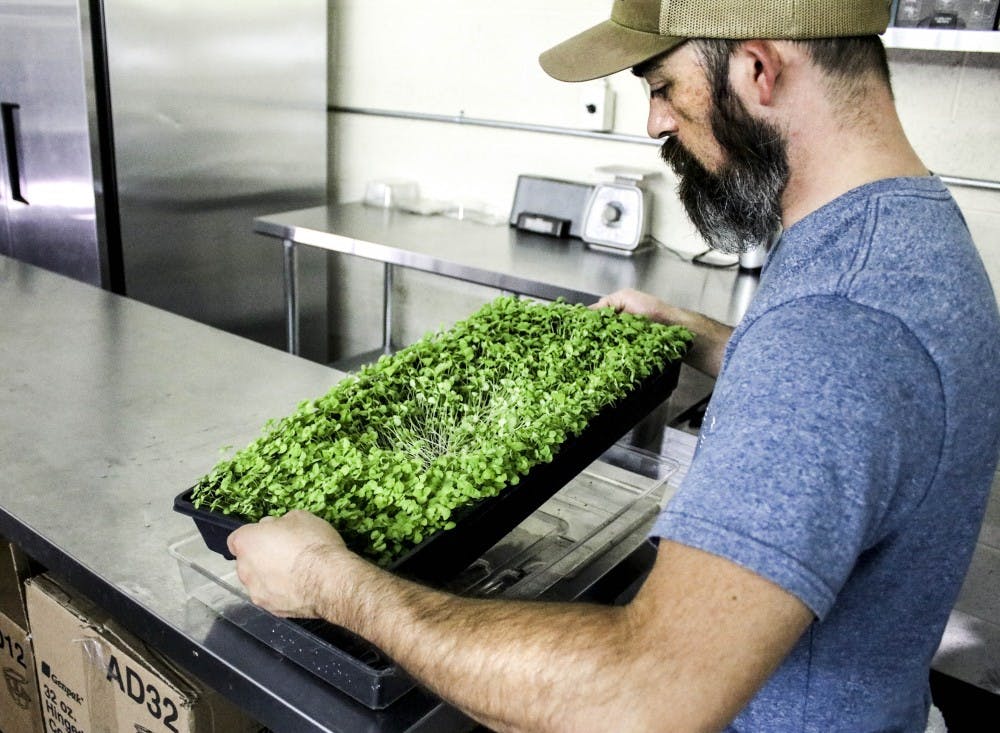Dreams are oftentimes rooted in realities. And so it is with the dream of local entrepreneurs Rebbekka and Ryan Tynan, founders of what they are calling Albuquerque’s first commercial aquaponic micro-farm.
Theirs is a dream that is rooted in perhaps some of the harshest of human realities: hunger and exploitation.
“Food scarcity really is the starting point for so much of this world’s strife,” Ryan said.
“Everybody has to eat,” Rebbekka agreed.
She said it was a newspaper article a few years ago chronicling the struggles of migrant workers that spurred her mission.
“It’s a travesty to see the things that people are dealing with on a day-to-day basis,” Rebbekka said. “Seeing that got me thinking: ‘There’s got to be a different way.’”
“A different model could help benefit so many different sectors,” she said, explaining the potential impact of alternative farming methods both at home and abroad, particularly in places like Venezuela and Yemen.
The farm operates on about 2,400 square feet of repurposed industrial space near Paseo del Norte, where roughly 2,500 gallons of water is filtered, treated and circulated, giving life to chard, three types of lettuce, three types of basil, bok choy, arugula, a dozen or so nutrient-packed micro-greens and a 200-fish tilapia farm.
Very little, if anything, goes to waste at Urbana. In fact, Rebbekka explained, waste from fish on the farm actually contributes a vital ingredient to the system. In a process called nitrification, ammonia from fish waste is oxidized and converted into nitrates typically found in soil, making it possible to grow produce in the now-nitrified water while still accommodating the fish.
Being indoors provides the farm with a physical barrier to many predatory insects, but Urbana implements organic pesticide techniques inside to ensure the safety of the operation in an eco-friendly way.
“This is something that needs to happen,” she said. “At some point we’re going to have no choice. We’re going to completely use up all of our land and deteriorate it to the point we can’t use it anymore, and this is going to be our only way to grow food at some point.”
Aquaponic microfarms like Urbana help combat harmful land use and chemical malpractice in farming, reduce carbon emissions from food transportation and increase the quality of produce on local markets all while conserving water.
Get content from The Daily Lobo delivered to your inbox
“We’re hoping to create a model that is going to be both profitable and sustainable,” Rebbekka said. “We don’t want to make profit just for profit’s sake...It’s shifting that mindset from greed and the bottom line to the impact of your business, and who it’s affecting and how we can have the greatest impact.”
“This is extremely feasible. There are people doing it everywhere,” she said.
The goal, Ryan said, is to achieve the same sustainable model of farming being utilized and demonstrated on alternative farms like Urbana on a large scale.
“The ultimate goal is to get this in third-world countries,” Rebbekka said. “If we can get this in Venezuela, if we can get this in Colombia, we can help maintain their culture.”
In effect, the Tynans have worked their way onto the front line of a struggle to flip the script in the produce industry by no longer producing for export and profit, but exporting the modes themselves of low-cost, sustainable food production.
“Not all farmers are as conscientious about how their business impacts the world as others are,” she said.
Although the physics, chemistry and ecology go a long way on the farm, the true driving force at Urbana — its guiding ethos — is balance.
For the Tynans, it’s balancing artificial ecosystems and pH levels with three others jobs and the weight of believing they can help ease human suffering in the world.
“If we intend on having fresh water to use at all in the future, agriculture is really going to need to lead the charge on finding more efficient ways to use it.” Rebbekka said. “It’s easy to fall into that convenience factor, but at some point, it’s not going to be that easy.”
Johnny Vizcaino is the Culture Editor at the Daily Lobo. He can be contacted at culture@dailylobo.com or on Twitter @thedailyjohnnyv.






